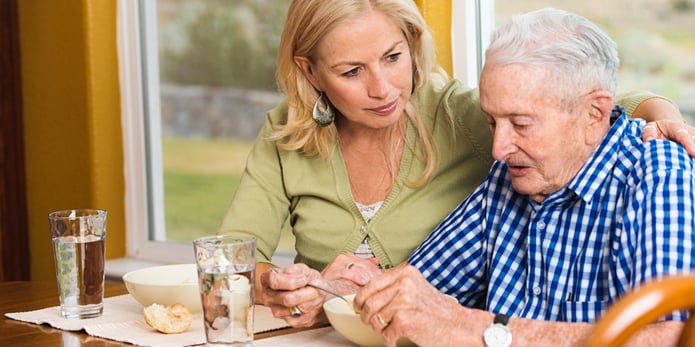
It’s normal to have a few unhealthy habits. But unhealthy habits like smoking or eating more processed foods than fruits and vegetables can affect you even more as you age.
When a habit has existed for years, developing new habits is easier said than done — especially if we’re talking about a parent who is over the age of 65. Change can be especially hard on older adults. It’s not unusual to find that parents resist change, no matter how great the benefits may be. So if you’ve already approached a parent or aging loved one hoping to motivate a change in habits and been met with resistance, here’s what you can do next.
The Importance of Habits for Seniors
Habits affect what you eat, what you wear, how you relate to others, how you spend or save money, and more. Habits are powerful — and they’re key to the eight dimensions of wellness for older adults.
The eight dimensions of wellness takes a holistic approach to aging that recognizes that all the different areas of our lives are connected. How exactly? Take for example what can happen when you lack sleep. It can impact your social relationships, physical and emotional reactions, productivity, and our ability to concentrate and accomplish tasks.
Aging often requires many lifestyle changes, from taking new medications to relocating to developing new social networks. Many of the leading causes of death are related to behaviors that people should be doing more often (e.g., eating healthfully, staying physically active) or avoiding (e.g., excess alcohol consumption, smoking). While younger adults may not experience negative side effects for many years, the consequences for older adults of not changing habits are potentially life-threatening. A poor diet, for example, can lead to heart complications or issues regulating blood sugar.
If you can help your parents change their habits for the better, you can help them change their lives for the better. So how do you help motivate their efforts to change?
Believing Change Can Happen
Before you can change a habit, you have to believe you can. This is easier when you’re young and you’re told that you can do anything you set your mind to. But as age settles in, a false sense of comfort can come from maintaining the same habits you have for years – whether healthy or not. Fear of the unknown can be a stronger motivator for not changing and older adults are innately risk-averse.
Is your parent feeling sluggish? Have they settled into a predictable daily routine that lacks engagement with others their own age or lacks activity besides walking from the living room to the bathroom? Feeling energetic and motivated to focus on wellness requires a daily investment, but the investment is very worthwhile. In fact, a Johns Hopkins study that tracked more than 6,000 people ages 44 to 84 for over seven years as they made healthy lifestyle changes — quitting smoking, following a Mediterranean-style diet, getting regular exercise — found that they decreased their risk of death in that time period by 80%.
While change might seem impossible, remember that as the saying goes, after 21 days, a habit is formed and after 90 days a lifestyle change has happened.
5 Keys to Successful Habit Change
So, how can your aging loved one develop positive habits?
1. Take Advantage of Their Strengths
If you want to help your aging parent build healthy habits, help them create new routines in one of the areas of wellness that will most positively improve your parents life, and take advantage of their strengths, tendencies, and aptitudes.
Let’s say that your mom wants to improve her physical health. She decides to wake up an hour earlier each morning to walk outside with her neighbor. But she's actually more of a night owl than a morning person. So the chances of her forming a new habit aren’t that high. On the other hand, if she starts walking with you over lunch, she might have a better chance of improving her fitness because the new activity suits her, not her neighbor.
2. Consider Underlying Challenges
It’s important to think about the underlying causes of habits that might need changing. For example, your loved one might eat mostly junk food because they no longer have the energy to cook healthy meals. Or they might not be following medication instructions because of depression.
In some cases, you might need to address a cognitive or physical wellness issue before moving on to changing the habit.
3. Frame the Change in a Positive Light
Let’s say your dad wants to change his eating habits. Instead of setting a negative goal, like “Eat less ice cream,” frame the habit in a positive light by setting a goal like “Eat more fruit.”
4. Set Realistic Goals
If your dad wants to quit smoking, encourage him to begin with cutting back the number of cigarettes he has a day. It helps to set a goal that he has confidence he can achieve.
5. Track Their Progress
Calendars can help your loved one remember when or how often we want to get things done, such as clean the refrigerator, celebrate an accomplishment, call a friend or family member, check our financial records, and schedule an annual physical.
Checklists can also help your loved one make sure that important tasks are not being forgotten. For example, this meal planning worksheet might help you and your aging parent make a grocery list full of options that are healthy and promote proper nutrition in this chapter of life. Or this health information tracker can help them share information with you and their health care providers on how they feel physically, emotionally, and mentally.
There are many other ways you can provide support while encouraging independence, such as asking your loved one to focus on what they want out of this next chapter of life, helping them change their mindset around aging, and focusing on what they can do, not what they can’t. By intentionally focusing on the eight dimensions of wellness, you can help your loved one identify what their core health values and needs are as well as the things that they need to live a fulfilled and healthy life.
To learn about the eight dimensions of wellness and habits that support each dimension, download our eBook Living a Healthier, Happier Life: A Guide Exploring Healthy Aging in Older Adults. Establishing new, better habits can be challenging, but it’s worth it.






